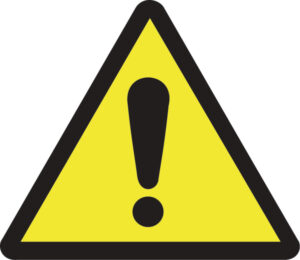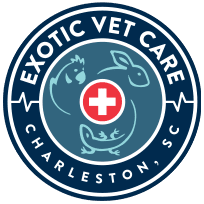
Many of the problems we see in birds and exotic pets are preventable. The best way to ensure your pet’s health, happiness, and longevity is having a qualified veterinarian perform a wellness exam with appropriate diagnostics such as parasite screens soon after bringing your new pet into your family and biannually after the first checkup. Many conditions we see have developed over weeks, months, or years, and the longer they continue, the more difficult they are to treat. Here we present the Top Ten Killers of Birds and Exotic Pets, so that you can avoid them:
1. Malnutrition
Malnutrition doesn’t mean starvation. Often, pets are obese as well as malnourished, due to overfeeding of an imbalanced diet lacking in appropriate nutrients. We will advise you as to the best type and amount of diet for your pet’s needs. You are what you eat! Parasites can also cause malnutrition, as they steal valuable resources from your pet. We will diagnose and eradicate those hitchhikers so your pet can grow and thrive.
2. Reproduction
Spaying and neutering your exotic pets is vital to their health and happiness, as well as your happiness, as a hormonal pet can behave in ways most people find disturbing and destructive. Hormones also cause reproductive tumors, cancers, and cysts which greatly impacts your pet’s quality of life. Creating and laying eggs is very taxing on the body and retained eggs can cause potentially lethal infections. Pets who cannot be spayed or neutered have other options, such as hormone therapy, to help prevent these conditions from developing. We will help you decide what is best for your pet.
3. Lack of UV Light
Many pets benefit from UVA/UVB lighting, as this mimics natural sunlight and helps the body metabolize and absorb calcium and other nutrients. Metabolic bone disease caused by calcium deficiency can result in crippling malformation of the bones as well as organ failure. We will enlighten you and make sure you have the right bulbs for your pet.
4. Extreme Temperatures
Exotic pets are typically not from here. Rabbits are built to stay cozy in cold environments, so the Southern heat and humidity can rapidly overwhelm them. Most pet birds are native to more tropical climes, so even our mild Carolina winters can be too frigid for comfort, but excessive heat can also be a hazard. We will let you know the appropriate temperature range for your pet’s comfort and safety.
5. Insufficient Sanitation
A dirty enclosure is not only unpleasant for you and uncomfortable for your pet, but can be hazardous to his or her health. Your beloved family member can develop urine scald, pressure sores, septic wounds, respiratory ailments, and other serious health conditions if left in unclean conditions. We will review proper husbandry and care with you to make sure you’re providing five-star accommodations for your housemate.
6. Chemical Exposure
From pesticides to household cleaners to scented candles, exotic pets face danger at every turn. Overheated Teflon pans release deadly fumes, and fireplaces create choking smoke. Their delicate respiratory systems cannot handle heavy fragrances and aerosolized matter, and surface residue can easily be ingested while grooming. Even all-natural products can have ingredients that are unsafe for your precious pet. Use caution with all products, and remove your pets from areas where these products are in use until the scent has dispersed and any residue has been removed.
7. Foreign Body Ingestion
As vital as what your pet eats is what your pet DOESN’T eat. Rabbits are notorious for chewing baseboards and chair legs, ferrets are famous for finding and eating anything and everything they come across, and curious birds have come to us with bellies full of eyeglass frames, screws and washers, and even an emerald earring. Some things that are not so foreign can cause huge issues as well, such as rabbit hair. Rabbits cannot vomit like cats, so a rabbit hairball simply remains in the stomach, causing gastric issues and eventually lack of appetite that is generally the reason for an emergency vet visit. Brush your rabbit daily to help limit the amount of fur ingestion, especially with fluffy, long-haired, or Angora breeds.
8. Household Accidents
From a bird who flew into a boiling pot to a hamster who walked off the edge of a counter, we have seen firsthand how a human home is fraught with danger for our pets. We have seen ferrets caught in reclining chairs, chinchillas shut in doors, and guinea pigs stepped on. While accidents do happen, it is important to be mindful of where your pet is at all times, and to have the little one safely in its enclosure or carrier when cooking, cleaning, painting, or in any circumstance where you are not free to pay full attention to where it is and what it is doing. Prevention is the best medicine.
9. Other Pets
As cute as it may seem to watch your bird ride on your dog’s back or your cat sniffing your sugar glider, things can turn deadly in an instant. Birds and exotic pets are prey animals, and predators know this. Even animals who have seemingly gotten along in the past can turn on each other with no notice. It is always better to be safe than sorry.
10. Other People
You’re so proud of your new pet, and you want to show him or her off to the world. Be careful how you handle the introduction, however, as not everyone knows how to properly hold a rabbit or rat or iguana, and sudden moves or instinctive bites by your pet can result in accidental injury as an unprepared human reacts as one naturally would. An animal that feels nervous or trapped may bite, scratch, or even flee, so make sure you are making your introductions in a pet-proof room with no escape routes. It is often better, especially when interacting with children, if you hold your pet while they gently stroke it or simply appreciate its beauty by looking, not touching.
We hope that this list helps bring awareness to the hazards you may not have considered, and that you and your pets stay safe, healthy, and happy. We are here for you whatever you need, and there’s nothing more rewarding and relieving than a wellness exam with a clean bill of health and the knowledge of how to do the best for your pet!

About Us
Our exotic animal hospital is dedicated exclusively to the care of birds, exotic small mammals, reptiles, and even fish! We can offer everything your pet needs for a healthy and happy life, from wellness care and grooming to diagnostics and dentistry, but we can also provide emergency care during our opening hours, along with more specialized treatment for referred patients.
